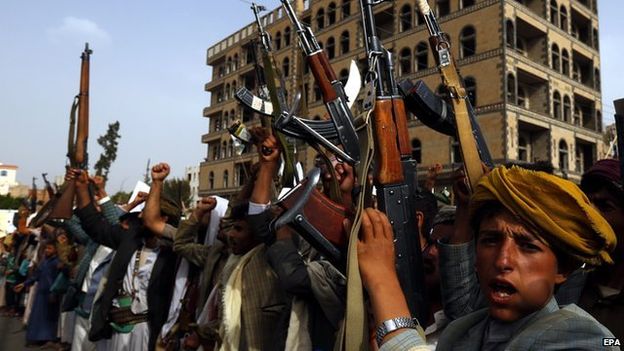Yemen Peace Talks Collapse
Houthi rebels

NEW DELHI: Peace talks between the internationally recognised government of Yemen and Houthi rebels failed to produce a ceasefire agreement in Geneva, with the country’s exiled foreign minister blaming the Shia rebels for the collapse.
Foreign Minister Riad Yassin said the Houthi representatives had stalled the process. "We really came here with a big hope and still we are optimistic that we will go into a peaceful solution for Yemen under the umbrella of the United Nations," Yasin told reporters. "But unfortunately the Houthi delegation did not allow us to really reach all progress as we expected. This is not getting as much success as we hoped but it doesn't mean that we have failed."
There have been numerous attempts to extend the talks, but were plagued with difficulties from the start. For one, the government-in-exile has insisted that Houthi rebels withdraw from the vast territory they have seized, and raised objections to the size of the delegation which is double the number of ten that was agreed upon.
The rebels, in turn, have demanded that air strikes be halted before they will agree to a ceasefire.
As the talks fail, no date has been set for resuming dialogue, with 20 million people in Yemen at risk. Air strikes led by the Saudi coalition which began March 26 -- on Houthi bases continue, with the Houthis in turn being allegedly backed by Iran.
The fighting has led to a crisis in Yemen, where according to the United Nations over 2600 people have died in the few months the fighting began. 21 million people are in desperate need for humanitarian aid. Relief workers have warned of a dire situation as civilians in Yemen remain in need of urgent medical and food supplies.
In this scenario, as rebels and US and Saudi-backed government forces battle each other, the unlikely winners are groups like the Islamic State and Al Qaeda. The Islamic State in Yemen has so far claimed several attacks, including a deadly attack on two Shia mosques earlier this year that killed 137 and injured 350 people. In May, soon after, the group claimed an attack on a Houthi mosque in Sana’a that wounded 13. Most recently, the group claimed a deadly attack on Shiite mosques and rebel Houthi headquarters in Sanaa earlier in June, killing 31 people.
All of the above is reflective of the US’ confused policy in West Asia -- where it is fighting Sunni rebels allied to the Islamic State in Syria and Iraq, but aiding Sunni forces against Shia militias in Yemen.
The scenario also underscores the need for a ceasefire, with UN Secretary General Ban Ki Moon having appealed for a two-week humanitarian ceasefire during the holy Muslim month of Ramadan, but fighting continues.
Despite the failure, the UN is optimistic. UN special envoy Ismail Ould Cheikh Ahmed, who was forced to shuttle between the delegations after they refused to sit down together, was quoted by the BBC saying, “there was "a certain willingness from all the parties to discuss issues around the ceasefire". "We managed to get suggestions from both sides that we can build upon in coming days in order to reach a permanent agreement," he added.
With intense fighting claiming thousands of innocent lives and contributing to a major humanitarian disaster in one of west asia’s poorest countries -- optimism, although not enough, is invaluable.



